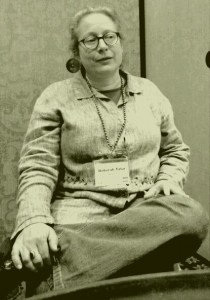
Deborah Tatar is a cognitive scientist at Virginia Polytechnic University whose current research focuses on understanding and clearing the obstacles to student learning in mathematics and science. For example, she was a principal investigator on the SimCalc project, a software-based interactive math curriculum for middle schoolers that has shown demonstrable success when accompanied by professional development for teachers. She is a collaborator on the CPATH Distributed Expertise project for which I am a co-PI.
In this conversation about what it takes to bring students from under-represented groups into computing, Tatar cautions against easy generalizations and simplistic solutions, offering intriguing possibilities for ways in which we can assist learners in finding the paths to understanding that are most appropriate for them.
Tatar’s insights remind me of Georgetown University math professor Jim Sandefur’s use of “think-alouds” – recorded interviews with students who explain their thought processes while working on math problems. It also echoes and complements the insights from Visible Knowledge Project, spearheaded by Randy Bass during the last decade. I was a researcher in that project in the early 2000s. My research project for VKP, “Blogging on the Beat” details my action research project on whether having journalism students keep blogs will lead deeper and more richly-sourced reporting.
This interview is part of my work in progress: The Re-Education of Me: Journalism, Diversity and Computing. Pearson, a long-time professional writing practitioner and educator, is using auto-ethnography and literary journalism to probe the implications of the transformation of journalism by computer science for journalism education. This interview was recorded at the National Science Foundation’s CE 21 community meeting in New Orleans, Lousiana Jan. 30, 2011.
View the interview (Quicktime file, runtime about 26 minutes)
![]() Sidebar: Learning about learning – a conversation with Deborah Tatar by Kim Pearson is licensed under a Creative Commons Attribution-NoDerivatives 4.0 International License.
Sidebar: Learning about learning – a conversation with Deborah Tatar by Kim Pearson is licensed under a Creative Commons Attribution-NoDerivatives 4.0 International License.
[…] and engagement that have many of us classroom teachers worried. As I’ve learned from talking to learning scientist Deborah Tatar, making assumptions about why whole groups of people aren’t grasping […]